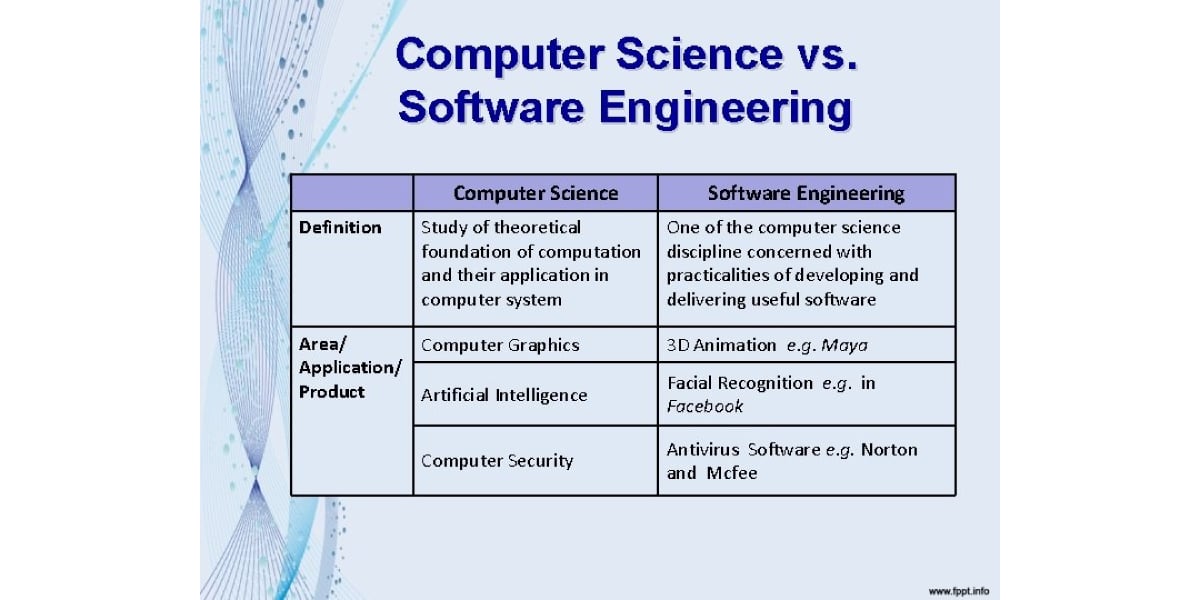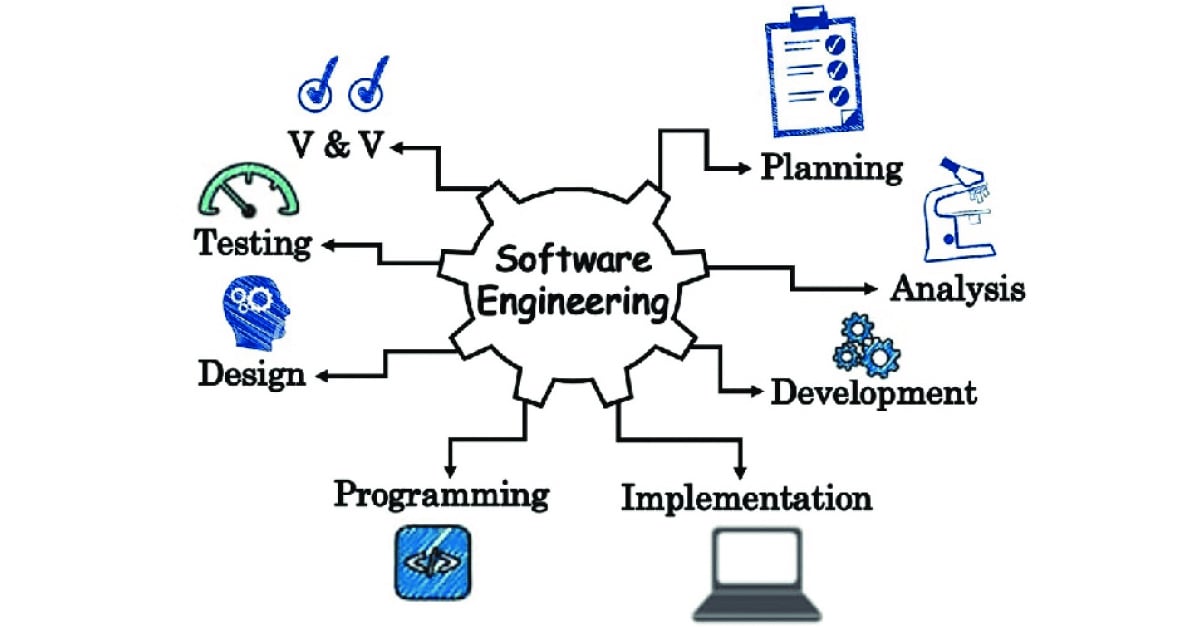Do you want to become a software engineer? A career in software engineering is quickly becoming one of the most exciting (and lucrative) paths in the tech industry. U.S. News reports that the median salary for software engineers is well into the six figures, and even rated software engineer as one of the five best jobs today.
But the term “software engineer” leads to some confusion. Despite their differences, the titles of software developer, software engineer, and programmer are oftentimes used interchangeably, and the software engineering process can vary dramatically between them. And it’s not just laypeople who make this mistake—even seasoned tech veterans continue to conflate the three.
That’s why we’ve written this guide. Below, we’ll detail everything you need to know about software engineering, and how it differs from other similar roles.
What Is Software Engineering?

Software engineering is the process of designing and creating software. This includes all stages of the software development process, including designing, developing, maintaining, and testing.
A software engineer’s role extends beyond coding. They also contribute to the design and architecture of software systems, utilizing their core computer science knowledge. By applying their problem-solving skills, software engineers design solutions that meet user requirements and deliver optimal performance.
According to the Bureau of Labor Statistics, software engineers are in high demand, with a projected growth rate much faster than the average for all occupations. This highlights the importance of certified software development professionals who possess the necessary skills and knowledge to excel in the field.
In addition to their technical abilities, software engineers also play a crucial role in the maintenance of software systems. They ensure that software remains functional, secure, and up-to-date, adapting it to evolving needs and addressing any issues that may arise.
Software engineers are a vital part of the software engineering field, contributing to the advancement of technology and innovation. They collaborate with systems developers, combining their skills to create complex and efficient software solutions. This collaborative effort helps organizations meet their operational needs and drive business growth.
10 Facts You Didn’t Know About Software Engineers
Software engineers are professionals who play a crucial role in the development and maintenance of software systems. They possess a unique blend of technical skills, problem-solving abilities, and creativity to create innovative and efficient solutions. Here are some interesting facts about software engineers:
- Software engineers are responsible for designing, coding, testing, and debugging software applications. They work with programming languages like Java, C++, Python, and Ruby to bring ideas to life and create functional and reliable software.
- Software engineers are involved in various stages of the software development lifecycle, including requirements gathering, system design, implementation, deployment, and maintenance. They collaborate with cross-functional teams to ensure smooth and successful project completion.
- The demand for software engineers is constantly growing. As technology continues to advance, industries across the globe rely heavily on software systems for their operations, creating a high demand for skilled software engineers. Software engineers are not limited to the tech industry. They are in demand across various sectors, including finance, healthcare, gaming, transportation, and more. Virtually any industry that relies on software systems requires the expertise of software engineers.
- Software engineers are problem solvers at heart. They enjoy tackling complex challenges and finding elegant solutions. They analyze problems, break them down into smaller components, and apply their technical expertise to develop effective software solutions.
- Continuous learning is a fundamental aspect of being a software engineer. With technology evolving rapidly, software engineers must stay updated with the latest programming languages, frameworks, and tools to remain competitive and deliver high-quality software solutions.
- Collaboration and teamwork are essential for software engineers. They often work in teams, collaborating with other engineers, designers, product managers, and stakeholders to develop software solutions that meet the needs of end-users.
- Software engineers value clean and maintainable code. They follow best practices, use design patterns, and write code that is easy to understand, modify, and extend. They also adhere to coding standards and employ version control systems to manage code changes effectively.
- Software engineers contribute to open-source projects. They actively participate in the open-source community by sharing their knowledge, contributing to existing projects, and creating new software tools that are freely available to the public.
- Software engineers prioritize software testing and quality assurance. They write unit tests, perform integration testing, and conduct system testing to identify and fix bugs, ensuring that the software functions as intended and meets the desired specifications.
- Software engineers often specialize in specific domains or technologies. Some focus on mobile app development, others on web development, machine learning, data science, or cybersecurity. This specialization allows them to deepen their expertise and tackle unique challenges in their chosen area.
How Is Software Engineering Used in Real Life?
The software used on our computers, phones, TVs, or any other digital product is the result of software engineering. Pieces of software that you can purchase—such as video games, photo editing software, or word processing software—are also made by software engineers. Essentially, all digital interactions happen because of software.
Famous Software Engineers
There are plenty of enterpreneurs who started off their careers as software engineers:
- Mark Zuckerberg: Co-founder and CEO of Facebook. Zuckerberg was a computer science student at Harvard University when he created Facebook in his dorm room
- Larry Page and Sergey Brin: Co-founders of Google. Page and Brin were PhD students at Stanford University when they developed the PageRank algorithm, which is the foundation of Google’s search engine.
- Steve Jobs: Co-founder of Apple. Jobs was a college dropout who worked as a software engineer at Atari before co-founding Apple in 1976.
- Bill Gates: Co-founder of Microsoft. Gates was a Harvard University student when he co-founded Microsoft with Paul Allen in 1975.
- Elon Musk: CEO of Tesla and SpaceX. Musk is a self-taught software engineer who founded Zip2, a web software company, in 1995.
It just goes to show – you never know where your software engineering qualifications will take you!
Understanding Software Engineering
A software engineer, with their technical expertise and knowledge of computer science, plays a vital role in the development and maintenance of software systems. They are responsible for designing, coding, and testing software applications using multiple programming languages.
Software engineers follow the software engineering process, which involves analyzing user requirements, designing software solutions, and implementing them through the development process. They use engineering principles and best practices to ensure the quality, reliability, and efficiency of the software they build.
Operating systems and network control systems are among the areas where software engineers apply their skills. They develop software that can run on different computer systems and integrate with network infrastructure. This enables the smooth functioning of software applications and their communication with other systems.
Software engineers collaborate with development teams, including systems developers and senior systems architects, to build complex software solutions. They work together to design software systems that meet the needs of internal customers and external users. The continuous integration of software developers’ efforts ensures the timely delivery of software products.
To become a software engineer, you’ll need computer science knowledge and proficiency in computer programming. Many software engineers pursue certified software development programs to enhance their skills and validate their expertise, but it’s not strictly necessary.
Software engineers are involved in the entire software development lifecycle, from software design and development to software testing and maintenance. They maintain the software they have built, ensuring its functionality and performance over time. They also document the infrastructure and processes to support ongoing maintenance and troubleshooting.
The demand for software engineers is high, as indicated by labor statistics, with various software engineering jobs available in the market. They can specialize in different domains, such as user interface design, data science, computer games, or infrastructure maintenance.
Here, we’ll cover some background information that will help you better understand the field of software engineering (and decide if you want to become a software engineer!).
The History of Software Engineering
As mentioned earlier, software engineering is used in the development and launching of rockets, and this is actually where the term was coined. Before the 1960s, the title of “engineer” was reserved only for complex physical machines. But as computer scientist Margaret Hamilton worked on the guidance and navigation systems for the Apollo missions, she decided the work done by her team deserved the same title. Within the decade, the first NATO software engineering reports were also released.
It took a while for the term to take hold, but by the 1970s, new ideas and programming languages such as Pascal and C started to appear along with the first personal computers (PCs). In 1979, Seattle University began offering its first degree in computer engineering.
In the 1980s, the C++ programming language was introduced, and object-oriented programming became popular. In 1989, the internet made its first appearance. From the 1990s onwards, video game consoles, home computers, phones, smartphones, tablets, and all sorts of technological innovations using complex software have become prevalent in our society.
The Goals of Software Engineering

A primary goal of software engineering is to enable the average user to interact with a computer—software allows us to send commands with the click of a button rather than typing out lines of code into a terminal. Software even helps users create complex projects with limited technical knowledge, such as website building software or game engines.
Is Software Engineering the Same As ….?
There are many niches and individual fields within the software industry, so we’ll cover a few here that are closely related to software engineering.
vs. Machine Learning

Machine learning is a discipline of artificial intelligence (AI) that allows a software application to learn from data fed to it and improve performance on tasks. It is related to software engineering in the sense that coding is required to design and manage these kinds of systems, but machine learning and software engineering are two very different disciplines.
vs. Computer Science

Computer science is an area of study related to how computers work and the various ways we can interact with them. Many professional software engineers have degrees in courses titled Computer Science, where they study topics like programming languages, operating systems, and algorithms. Unlike software engineering, the study of computer science isn’t directly connected to the development of software.
vs. Data Science

Data science is a specific area within the software industry that deals with the analysis and manipulation of large data sets. While programming languages are used to create programs and algorithms that can store and sort the data, the field is not connected to the creation of user software in the way that software engineering is.
Get To Know Other Software Engineering Students
Jason McGinty
Full-stack Systems Engineer at Technicity
Oscar Herrera
Student In The Software Engineering Bootcamp at Springboard
Kristy Chu
Software Engineer at FloQast
Understanding the Software Engineer
Now that we’ve covered the software engineering discipline let’s take a closer look at what a software engineer actually does.
What Does a Software Engineer Do?
The particular responsibilities of software engineers vary significantly depending on the industry they work in, but generally, they work on designing, developing, and maintaining software applications.
This includes a number of jobs such as writing, optimizing, and debugging code in order to develop new software or expand and improve on existing software.
Software Engineering Career Opportunities
In this section, we’ll cover the job descriptions and salaries of some of the roles within the software industry that software engineers can fill.
Software Engineer

While more specific job titles are often used within the software industry, you will also see job adverts searching for software engineers. This term is often used by SaaS (Software as a Service) companies that develop and support large, complex pieces of software and employ hundreds of engineers to work on it.
What They Do
Software engineers generally work in teams to support, maintain and develop a certain section or feature of a larger piece of software. Responsibilities are often split between colleagues based on each team member’s specialties, as there are many areas of the practice of software engineering and development that you can excel in.
How Much They Earn

Average salaries for software engineers can range from $68,000 – $166,000, according to Glassdoor, with high salaries at large firms such as Google reaching up to $270,000 for an experienced software engineer.
Skills Needed
Common software engineering skills listed in job descriptions include:
- Proficiency in a programming language such as C++
- Excellent time management skills
- The ability to write and develop software
- Creating and running tests for software
- Management and maintenance of software
- Debugging
- Software project management skills
Front-End Engineer

Front-end engineers are mostly found in the web development industry and specialize in programming languages like Python.
What They Do
Front-end engineers create front-facing elements of websites, applications, and interfaces. While the design team will take care of the art and aesthetics of the product, it’s the front-end engineer who implements the designs into an interactive interface that the customers can use to navigate the product.
How Much They Earn

Front-end engineers receive an average salary between $84,000 – $194,000 depending on skill level and industry. At top companies like Meta, an experienced engineer can make up to $274,000 per year.
Skills Needed
Commonly required skills for front-end developers and engineers can include the following:
- Proficiency in Python, HTML, Javascript, and CASS
- A basic understanding of user interface design principles
- Knowledge of APIs
- Some understanding of back-end engineering fundamentals
- Optimizing websites for multiple devices
- Debugging and testing code
Back-End Engineer

Back-end engineers are also part of web development and specialize in server management and data storage.
What They Do
Unlike the front-end role, back-end engineers work on the parts of a website, application, or piece of software that can’t be seen from the user’s perspective. This includes handling the server and the back-end of the APIs, as well as managing and storing user data according to best security practices.
How Much They Earn

Back-end engineers can expect to earn between $99,000 – $204,000 on average, with positions at top companies such as Google paying as much as $305,000 per year for senior engineers.
Skills Needed
To excel as a back-end developer, you can expect to need skills such as:
- Proficiency in a programming language such as Java, PHP, Python, or Ruby
- Soft skills for cooperating with front-end engineers
- Designing data storage solutions
- Integrating user-facing elements with back-end logic
- Debugging and optimizing code for scalability
Related Read: Front-End vs. Back-End Development: What’s the Difference?
Getting Into Software Engineering
If you’re considering getting into software engineering, here is some basic information to help get you started.
What Skills Will You Need?

There are a number of general software engineering skills that make up the fundamentals of the discipline and are used no matter what niche or industry you go into. One of the most important skills is learning to code and becoming proficient in a relevant programming language. Other skills include:
- Good knowledge of computer science fundamentals
- Skills in optimizing and cleaning up code
- Debugging and bug fixing skills
- Critical thinking and time management skills
- Public speaking and communication skills
What Background Is Preferable?

The typical background of a software engineer includes a college degree in a software engineering program or computer science degree. However, other forms of education are becoming more commonplace, and big tech companies such as Microsoft are moving toward removing traditional degrees as a requirement for hiring. Instead, more and more aspiring software engineers are attending online coding bootcamps that aim to produce job-ready graduates. These bootcamps take much less time than a college degree and are far more affordable, leading to the industry growing from 2,178 graduates in 2013 to 24,975 graduates in 2020.
Where Should You Start?
There are various ways to start your software engineering journey, including free online software engineering programs, software engineering certification programs, self-study, or bootcamps. If you’re a complete beginner and don’t feel ready to start a bootcamp right away, there are also prep courses that can take you through the absolute basics and get you ready to begin the full curriculum.
How do I know if software engineering is a good career for me?
Choosing a career is an important decision that requires careful consideration of your interests, skills, and goals. If you have an affinity for technology, problem-solving, and logical thinking, software engineering may be an excellent career path for you.
Passion for Computer Science
Software engineering is rooted in computer science principles, so having a genuine interest in this field is crucial. If you enjoy exploring algorithms, data structures, and computer programming, it’s a strong indicator that software engineering aligns with your passion.
Analytical and Problem-Solving Skills
Software engineers are problem solvers by nature. They analyze complex issues, break them down into manageable components, and develop effective solutions. If you have a knack for identifying patterns, troubleshooting, and thinking critically, software engineering will allow you to apply and enhance these skills.
Programming Proficiency
Proficiency in programming languages is fundamental to software engineering. While you don’t need to be an expert in multiple languages from the start, a strong foundation in at least one programming language is essential. If you enjoy writing code, solving programming challenges, and continuously learning new languages, you’ll find fulfillment in software engineering.
Continuous Learning and Adaptability
Software development is a dynamic field with ever-evolving technologies. Software engineers must be committed to lifelong learning, staying updated with new tools, frameworks, and best practices. If you embrace continuous learning and enjoy staying at the forefront of technological advancements, software engineering offers ample opportunities for growth.
Attention to Detail
Software engineering requires meticulous attention to detail. Writing clean and efficient code, debugging complex issues, and ensuring software reliability all demand a keen eye for detail. If you naturally gravitate towards precision and have a knack for spotting errors, software engineering can be a rewarding career path.
Collaboration and Communication
While software engineers often work independently, effective collaboration and communication skills are essential when working in teams. Collaborating with other developers, product managers, and stakeholders is vital for successful software development projects. If you enjoy teamwork, effective communication, and finding creative solutions through collaboration, software engineering will provide ample opportunities to work in diverse teams.
Remember, making an informed decision about your career path involves conducting thorough research, exploring different aspects of software engineering, and gaining hands-on experience through internships, personal projects, or online coding platforms. Engaging with professionals in the field, attending software engineering conferences, and seeking mentorship can also help you decide.
What Can I Specialize In?
Software engineering is a vast field with numerous specialization opportunities. As you progress in your career, you may find it beneficial to specialize in specific areas that align with your interests and career goals. Here are some popular specialization options within software engineering:
- Full-Stack Development: Full-stack developers have expertise in both front-end and back-end development. They are skilled in building user interfaces, working with databases, and handling server-side programming. This specialization allows you to take a holistic approach to software development.
- Mobile App Development: With the proliferation of smartphones, mobile app development has become increasingly important. Specializing in mobile app development equips you with the skills to create intuitive and engaging applications for iOS, Android, or cross-platform frameworks.
- Web Development: Web developers focus on creating websites and web applications. This specialization involves proficiency in HTML, CSS, JavaScript, and frameworks such as React, Angular, or Django. Web development offers diverse opportunities in e-commerce, social media, and content management systems.
- Data Science and Analytics: Data-driven decision-making is crucial for businesses today. By specializing in data science and analytics, you can leverage your software engineering skills to extract insights from large datasets, build machine learning models, and create data visualization tools.
- DevOps: DevOps engineers bridge the gap between software development and operations. They streamline the software development lifecycle, automate processes, and ensure efficient collaboration between development and IT teams. Specializing in DevOps equips you with skills in continuous integration, deployment, and monitoring.
- Cloud Computing: As businesses increasingly rely on cloud infrastructure, specializing in cloud computing allows you to design, develop, and deploy applications on cloud platforms such as Amazon Web Services (AWS), Microsoft Azure, or Google Cloud. Expertise in cloud technologies offers scalability, security, and cost-effectiveness.
- Security Engineering: With the rising threat of cyber attacks, security engineering has become a critical specialization. As a security engineer, you focus on developing secure software systems, implementing encryption techniques, and conducting vulnerability assessments to protect sensitive data.
- Embedded Systems: Embedded systems are specialized computer systems designed to perform specific functions within larger devices. Specializing in embedded systems involves working on firmware development, hardware-software integration, and optimizing performance in areas like automotive, medical devices, or Internet of Things (IoT).
- Game Development: If you have a passion for gaming, specializing in game development can be a rewarding choice. Game developers create interactive and immersive experiences by combining programming, graphics, physics, and artificial intelligence. This specialization combines creativity with technical expertise.
- Machine Learning and Artificial Intelligence: Machine learning and AI are rapidly evolving fields. By specializing in this area, you can develop intelligent systems, natural language processing algorithms, recommendation engines, and predictive models that automate decision-making processes.
Remember that software engineering is a field that continually evolves, so it’s important to stay updated with emerging technologies and industry trends. With the right specialization, you can position yourself for exciting career opportunities and make a meaningful impact in the world of software engineering.
Interview Questions for Software Engineering
Preparing for a software engineering interview requires understanding the key areas that employers often focus on. Here are some common interview questions that can help you showcase your skills and knowledge:
- What programming languages are you proficient in? Employers are interested in assessing your programming skills. Be prepared to discuss your proficiency in languages such as Java, Python, C++, or others relevant to the job.
- Can you explain the software development lifecycle? This question evaluates your understanding of the stages involved in software development, including requirements gathering, design, implementation, testing, deployment, and maintenance.
- How do you approach problem-solving in software development? Employers want to gauge your problem-solving abilities. Describe your approach to analyzing problems, breaking them down into smaller components, and designing effective solutions.
- What is your experience with version control systems? Version control is crucial for collaborative software development. Discuss your experience with popular systems like Git, and highlight how you use them to manage code and collaborate with other developers.
- Can you explain the concept of object-oriented programming (OOP)? OOP is a fundamental paradigm in software engineering. Be prepared to explain the principles of encapsulation, inheritance, and polymorphism, and how they are applied in real-world scenarios.
- How do you ensure software quality and reliability? Employers are interested in your knowledge of quality assurance techniques. Discuss how you write unit tests, perform code reviews, conduct debugging, and ensure overall software reliability.
- Have you worked on Agile or Scrum projects? Agile methodologies are widely used in software development. Describe your experience working in Agile teams, including your familiarity with Scrum ceremonies and collaboration within sprints.
- Can you provide an example of a challenging software project you worked on? Employers want to assess your problem-solving abilities and how you handle complex projects. Share an example of a challenging project, discussing the obstacles you faced and how you overcame them.
- How do you stay updated with new technologies and industry trends? Demonstrating a commitment to continuous learning is important. Discuss how you stay informed about the latest technologies, tools, and frameworks, and how you incorporate them into your work.
- Describe a situation where you had to work collaboratively with a team. Effective collaboration is crucial in software engineering. Share an experience where you collaborated with team members, communicated effectively, and achieved a common goal.
FAQs About Software Engineering
Here are some frequently asked questions about software engineering.
Is Software Engineering a Good Career?
Yes. Software engineering is a well-paid career with high job satisfaction, and it also has plenty of opportunities for promotions and moving around. Large companies operate all over the world and sponsor visas to help you and your family live in your preferred country and also provide competitive benefits.
Qualified software engineers also enjoy job security, with the U.S. Bureau of Labor Statistics projecting a 25% job growth rate between 2021 – 2031, which is 20% higher than the average.
Related Read: 12 Highest-Paying Software Engineering Jobs
Can You Get Into Software Engineering Without a Degree?
While qualified software engineers do typically hold a college degree from a software engineering program, it is becoming more common for companies to omit degrees from the hiring requirements.
With the rise of online bootcamps, the accessibility of personal computers, and the plethora of self-study materials available on the internet, there are many methods to study the skills of software engineering other than college degrees.
Can You Land a Software Engineering Job Without Experience?
There are entry-level positions for new graduates and junior software engineers, but it’s always best to build up as much experience as possible. This can be done by picking up freelance, open source, or volunteer work during your study and working on personal projects that can be included in your software engineering portfolio.
If possible, you can also gain valuable experience with a software engineering internship.
Since you’re here…
Interested in a career in software engineering? Join our mentor-led Software Engineering Bootcamp or our foundational Software Engineering Course if you’re just starting out. We help people make the switch every day (just peep our reviews). You can do it, too!
![What Is Software Engineering [2023 Overview Guide]](https://www.springboard.com/blog/wp-content/uploads/2023/06/what-is-software-engineering-2023-overview-guide.jpeg)






